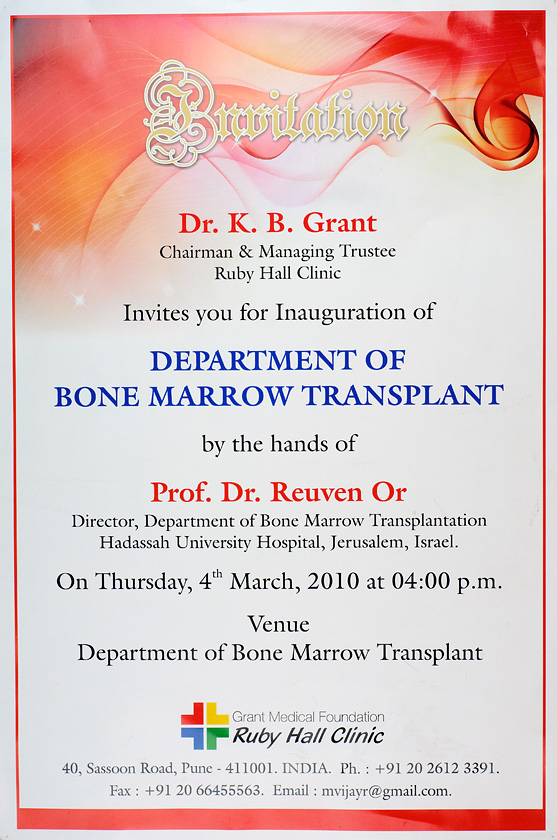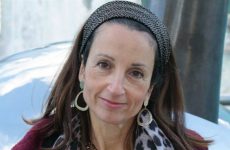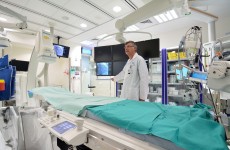Prof. Reuven Or:’Israeli & Indian Researchers Now Collaborating In Field Of Bone Marrow Transplantation’
‘I Hope For Joint Project On Natural Killer Cells That Can Effectively Fight Cancer Cells’
‘Dr. Grant, My Indian Colleague Is A Giant Of A Doctor, Who Has Recruited Highly Professional Staff At Ruby Hall Clinic In Pune’
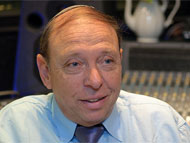
The Bone Marrow Transplantation Department at Hadassah Medical Center in Ein Kerem, Jerusalem has been at the forefront of research and clinical treatment since this field started playing a major role in the treatment of cancer. Its department director, Prof. Reuven Or has just returned from a working visit to India where he gave seminars at three hospitals and participated as a consultant in the opening of the new Bone Marrow Transplantation department at the Ruby Hall Clinic in the Pune urban region. In an exclusive interview with David Essing, Dr. Or also disclosed that more joint projects are now underway.
First of all Prof. Reuven Or could you tell us about your own personal background?
Prof. Or: I was born in Petach Tikvah (Israeli town) and actually on my father’s side, the family came to Petach Tikvah more than 120 years ago. The grandfather of my father was the first one who came and he was the first rabbi of Petach Tikvah. Since then our family has lived in Israel.
And what of your medical training and background?
Prof. Or: After my army service, I went to medical school and then I started my training at Jerusalem’s Hadassah- Ein Kerem hospital in internal medicine and hematology. I was lucky that this was at the time that bone marrow transplantation was starting as an innovative medicine in the world. So I was one of the first doctors involved in the clinical application of bone marrow transplantation at Hadassah.
Was there any special reason why you were attracted to this field of medicine?
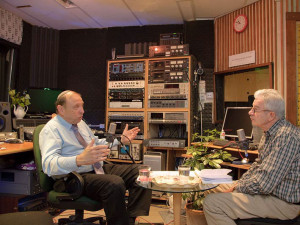
Prof. Or: First of all, I was very excited by hematology, this field of medicine treating blood diseases. The blood cells are so sophisticated – this attracted me and I thought that in hematology, by treating very sick patients not only with leukemia but other diseases including genetic diseases , that I could accomplish my mission not only as a physician but also as a researcher. It’s a combination that I thought would enable me to better help people than in other fields of medicine.
You are deeply involved in advanced research at Hadassah – how would you compare this work with other research internationally?
Prof. Or: I think that over the years we have been involved in the major milestones in the development of stem cells transplantation and this was from the very beginning. What is unique about our department is that we observe things in the laboratories in parallel with our very active clinical work and very active basic research – we have laboratories with students. We try to investigate problems that are related to the patients in the laboratories. We look for solutions at the ‘ bench’ and bring them to the patient’s bedside.
Just how important is this work in the treatment of cancer and other fatal diseases?
Prof. Or: It is extremely important, I will give you an example. In the first years, when we performed bone marrow transplants we thought the most important part of the transplant was in the pre-transplant conditioning- with chemotherapy and radiation. This was thought to be the most important and the bone marrow cells served only in the rescue of the recipient after the high doses of chemo and radiation. We were one of the first to discover that we can switch the balance from the conditioning, the pre-transplant preparation to the major biological impact of the transplant- which are the new immune cells in the body of the recipients that possess the best potential to cure cancer better than radiation and chemotherapy. This was a major step forward in the understanding of how to treat leukemia, lymphoma and other diseases with cells rather than chemo and radiation.
This sounds almost revolutionary.
Prof.Or: Yes, this was revolutionary, absolutely because we discovered that immune cells from the donor can eliminate the last tumor cells from the body of the recipient much more effectively than the other toxic reagents.
I understand that your work is not only conducted here in Israel but that you also collaborate with other researchers abroad. In fact, you have just returned from a working visit to India. Could you describe this?
Prof. Or: In general it is very important in medicine, and especially in our field of stem cells transplantation to collaborate with other centers and to exchange knowledge. As we say in Hebrew ‘ both to learn and to teach’. This is part of the process in advancing medicine. In addition, I see it as one of our duties to help other countries to have better medicine, especially in bone marrow transplantation. So I was invited to India, to Mumbai and Pune, to give seminars in three hospitals and in Pune we opened the bone marrow transplantation department in the Ruby Hall Clinic.
It’s relatively a new hospital and they opened a new department for bone marrow transplantation. We will assist them in the near future, give consultation and help them overcome difficulties that we always have at the beginning.
Will this collaboration also include joint research projects?
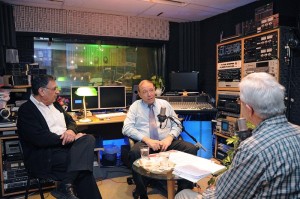
Prof. Or: Yes, joint research will help very much to better understand how to do transplantation and to perform better treatment, pre-transplant and post-transplant. Only by collaborating and the exchange of experience – this is the only way to improve the transplant procedure and the potential curative of this field of medicine.
How would you assess the level of medicine and research that you found in India?
Prof. Or: In general the level of medicine in the university hospitals in India is very high. Doctors are well-trained and extremely good. My impression was they have a population of relatively young doctors who are very energetic and highly motivated to improve the level of medicine and to provide their patients with the best possible medicine they can perform. They are also highly motivated to collaborate in gaining experience from others . Doctors from India would like to visit us and spend some time in our department to get a first hand view of our experience.
And what of the experts, colleagues that you met in India?
Prof. Or: In Pune, I was really excited to meet Dr.K.B. Grant, who was the founder of the the Ruby Hall Hospital. He is a giant of a doctor, very well experienced and the hospital was developed by his vision. He is really the one who pushed for more medical services there and also in other fields.and various fields of medicine. He recruited young Indian doctors, hematologists and gave them the opportunity to open the department of bone marrow transplantation. He appointed as department head, Dr. Vataran, a young well-experienced hematologist, who is very energetic and enthusiastic about giving the best treatment possible and he would like to collaborate with us. Their whole team in the clinical ward, research and radio therapy, they are all very excited about their work willing to learn and are hard workers – ready to do all they can for their patients.
Is their any particular joint project that you would like to see Israel and India working on?
Prof. Or: Yes, we would like to explore the role of the immune cells from healthy donors – immune cells from healthy donors – how they can better treat refractory diseases especially leukemia, lymphoma and some other solid tumors like breast cancer and ovary cancer. We would like to collaborate on the application of immune therapy that means to take healthy cells from healthy donors and to activate them in the laboratory to make them stronger in fighting cancer cells. These are what we call ‘natural killer cells’ that have the capacity to destroy cancer cells, to induce the death of cancer cells. In India, they have no experience in this. We would like to collaborate with them, to give them our protocols and methods on how to prepare these cells and to increase the involvement of doctors there in immune therapy treatment of refractory diseases , of deadly diseases.
Is there a joint program with Indian researchers now underway?
Prof. Or: Absolutely – we have started the program – we gave them are protocols and now we are communicating on how to start treatment with the first patients.
You have described how Israel is in the forefront of this research so important in treating cancer. Are you also interested in expanding this collaboration with other countries?
Prof. Or: It’s a very important question. Of course, we would like to help every country, every hospital that would like to get our assistance and experience. Of course, there is another aspect; since the world is shrinking and patients can travel from one country to another. We can also treat patients here at Hadassah and not only provide them hopefully with better health but these patients can then go back to their own countries s n they can go back home and be monitored by their own doctors. In so doing, these doctors will gain personal experience from these patients on how to treat very aggressive diseases and observe the post-treatment outcome.
Do you have any patients from India now being treated at Hadassah?
Prof. Or: Currently we e have one patient, a youngster from Mumbai. He is now recovering, has recovered, after arriving at Hadassah with a very, very aggressive disease that could not be treated in India- all the treatments there failed. He was really hopeless so they decided to send him to Hadassah. We tried a very sophisticated transplant with an unrelated donor- it was a very complicated and stormy course of treatment but Thank G-d, he gradually recovered and has now recovered. Within a month he will go back to India. I believe the doctors who will care of him back home will learn a lot from the experience with this patient. This is personal experience that can teach about the procedure of bone marrow transplantation.
